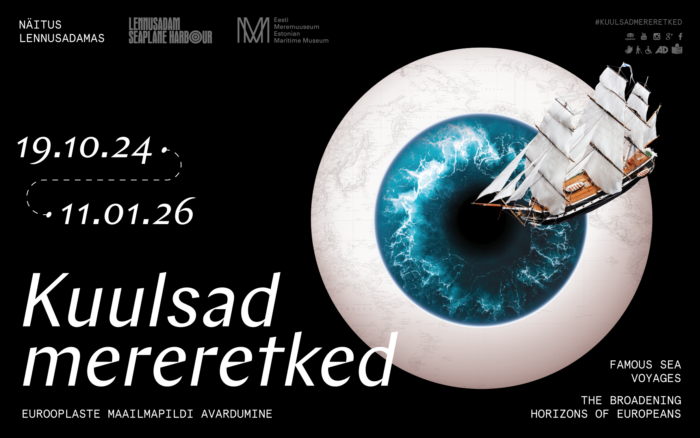19.10.2024 – 11.01.2026

The new exhibition at the Seaplane Harbour transports visitors back to an era when the great powers of Europe were in a race to discover the last ‘blind spots’ on the planet.
With copious illustrations, maps, and items, the exhibition tells the story of the great expansion of the geographical view of the world that took place from the mid-eighteenth to the mid-nineteenth century, spurred on by the rapid development of technology, cartography, and the natural sciences.
The expeditions continued even after the end of a sea voyage, because all of the explorers published their travel journals – the leading scientific works of the era. Explorers from what is now Estonia were key figures at the time. Adam Johann von Krusenstern’s atlas of the Pacific ocean, one of the best in all of Europe when it was published, was a remarkable contribution to the history of exploration. The exhibition takes the visitor to Krusenstern’s workshop, presenting his scientific accomplishments and highlighting the importance of the international network in the work of a cartographer.
However, the legacy of those voyages of discovery, which were worthwhile in terms of research, is in many ways problematic today, and the sensitive issues of colonialism and imperialism are also analysed in the exhibition.
This grand exhibition at the Seaplane Harbour includes historical artefacts on display from memory institutions in France, the Netherlands, England, Finland, Sweden, and Estonia. The National Maritime Museum of the UK has provided navigational instruments belonging to British explorers, the best of their time. The pride and joy of artefacts from the Musée National de la Marine in France is the Lionne (later renamed Astrolabe), a recently refurbished ship model from the Trianon collection commissioned by the French Emperor Napoleon. A highlight exhibit from the Amsterdam Maritime Museum will be a chronometer belonging to Krusenstern, which he also used on his circumnavigation of the globe.
Visitors of the exhibition can experience the more exciting parts of the life of a ship’s crew. A ship’s mast stands tall at the exhibition, along which you can climb up beneath the domes of the hangars of the Seaplane Harbour. The most daring can also put themselves to the test by free jumping from the top of the mast!
This is an adventurous attraction, participation is at your own risk and requires completion of a safety briefing.
A trail of ship rats hidden in the corners of the exhibition introduces the work done on a ship and the everyday life of the time to younger visitors.
Let’s hoist our sails and venture out into the unknown!
Guided tour is available. Price is €45 for Estonian / €55 for the other languages. The price does not include admission to the museum. The recommended tour group size is up to 20 persons. Tour can be ordered in Estonian, Russian, English and Finnish and it lasts up to 60 minutes. Send an inquiry HERE
You can climb to the top of the mast or take a walk on a arch bridge. Learn more.
EXHIBITION TEAM
Curator: Feliks Gornischeff, PhD
Exhibition Design: Andres Labi, Ruumilabor OÜ
Graphic Design: Refleks OÜ
Execution: Fratelli Grupi OÜ
Digital solutions: Platvorm OÜ
Children’s exhibits: Mae Kivilo
Sound design: Taavi Tulev
Consultants: Lauri Laanisto, Anette Pärn, Mari Jõgiste, Maria Sakarias, NGO Mondo
Ethnography consultant: Jean-Loup Rousselot, PhD
Creative consultant: Sander Olo
Creative writer: Jan Teevet
Actors: Kristo Viiding, Jim Ashilevi, Andres Ots
Audio engineering for texts: Taaniel Pogga
Language editing: Hille Saluäär
Translations: Tõlkebüroo Pangloss
Estonian sign language: Jari Pärgma, Eesti Viipekeele Selts
Plain language: Kerttu Rakke, Janek Muru, Vaimupuu MTÜ
Tactile exhibits: Joonprojekt OÜ, Fratelli Grupi OÜ
Audio description and accessibility consultation: Katriin Reinsoo, Artur Räpp
Education: Helene Uppin, Kristel Bultot, Carmen Kõrvek
Technical solutions: Helina Torv, Valter Vaht, Tõnis Veltman
Conservators: Maria Väinsar, Heiti Kulmar
Installation: Berit Teeäär, Valge Kuup OÜ
Item preparation: Ruth Ristmägi, Oksana Leontjeva, Laura Jamsja
Lighting: Veljo Sakkos, Eventech OÜ
Printing: Digitrükk OÜ
Mast climbing: Seikluspargid Tallinnas, 3Park
Procurements: Maie Tooming
Marketing project manager: Iris Tomson
Exhibition project manager: Marii Väljataga, PhD
Special thanks to: Urmas Dresen, Roman Matkiewicz, Mihkel Karu, Liisa Kruustük, Teele Siig, Kadi Karine, Anna-Liisa Õispuu, Lisette Reinvars, Sander Jürisson, Raivo Plado, Martin Veermäe, Katrin Savomägi, Andres Eero, Evelyn Silmet, Kristina Milbach, Hene-Riin Männik, Külli Rande, Annika Jaup.
The exhibition was brought to life in co-operation with memory institutions in Estonia and abroad: Musée National de La Marine (Paris), National Maritime Museum (Royal Museums Greenwich, UK), Het Scheepvaartmuseum (Holland), David Rumsey Map Center (Stanford University Libraries, USA), Släktföreningen von Krusenstierna (Family Association von Krusenstierna) and Kalmar Läns Museum in Sweden, Forum Marinum in Finland, Estonian National Museum, Estonian History Museum, Tallinn City Museum, Tallinn University Academic Library, University of Tartu Library, National Archives of Estonia and Kiltsi Manor. NGO Mondo invites visitors to discuss the colonial legacy of maritime exploration at the exhibition.
Exhibition created with the support of: Eesti Kultuurkapital, Eesti Teadusagentuur, Ministry of Education and Research
The completion of the exhibition has been supported by the national project competition for the popularization of science.